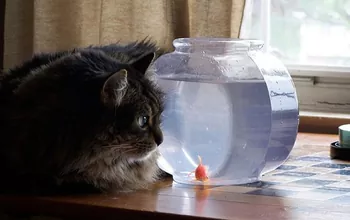
Before feeding your cat fish, consider these factors
There’s something fishy going on! Here are a few reasons why you should think twice before feeding your cat fish
The mere smell of fish may make your cat go crazy, but it isn’t the best food for him. Fish, especially when fed in large amounts or consistently over a long period of time, can actually cause more harm than good to your cat. Find out why you should reconsider feeding your cat fish-based foods.
The consumption of fish is addictive and allergenic
Fish is a protein that cats will easily become addicted to, so the more you feed him fish, the more he’ll want it. Fish wasn’t evolved for cats to eat. The desert-dwelling ancestors didn’t have access to water where they could catch fish, so they mostly ate rodents.
If the same protein is fed repeatedly over a long period of time, it can cause allergies. Fish is also one of the most allergenic ingredients in cat food. The symptoms of allergies, which result in inflammation, can be similar to those of other diseases, making it difficult to pinpoint the cause. You should rotate proteins in your pet’s diet and eliminate or greatly reduce fish from their diet if your pet suffers from respiratory problems such as asthma or skin conditions.
The consumption of fish can lead to deficiencies
Furthermore, fish may cause deficiencies in thiamine, a B vitamin, as well as vitamin E. Thiamine deficiency symptoms include lack of appetite, seizures, and death. Deficits in vitamin E can lead to yellow fat disease, also known as steatitis, which can be fatal.
It is possible for fish to contain toxins
Global pollution has made fish one of the most contaminated food sources. Today, toxic metals like mercury, pesticides like DDT, and chemicals like dioxin and PCB are found in a wide variety of fish, particularly large fish like tuna and salmon.
Mycotoxins can also contaminate fish meal, which is often preserved with a carcinogenic preservative called ethoxyquin. Furthermore, since this preservative is added to raw fish before it’s shipped to a pet food manufacturer, it may not be listed on the final product’s label. Ask the manufacturer if a food with fish meal as an ingredient is free of ethoxyquin if you are buying it.
Iodine levels in fish are too high
Iodine is an essential nutrient for maintaining a healthy thyroid, keeping disease at bay, and performing at its best, but too much of it can result in hyperthyroidism. Fish is rich in iodine, and many pet food manufacturers add an iodine supplement to their foods to make sure your cat gets enough. If your cat eats too much fish, it will accumulate too much iodine in the body, increasing its risk of hyperthyroidism, which is hard to treat unless caught early.
Urinary Tract Issues Can Be Caused by Fish
The magnesium in fish can also form magnesium ammonium phosphate crystals, also called struvite crystals. An improper diet causes many cats to have this problem. You can reduce the risk of your cat developing this painful and potentially deadly condition by avoiding dry food, foods high in carbohydrates and grains, and fish-based foods.
Is it safe to feed your cat fish?
Omega-3 fatty acids found in fish are important for your cat’s health, according to Dr. Karen Becker, DVM. These fatty acids can be provided by feeding the right types of fish in small amounts. Sardines that are packed in water are a good option, but you should be aware that these can contain a lot of salt, so you should only feed your cat sardines sparingly. Another good option is wild caught salmon. Alternatively, you can supplement your cat’s diet with krill oil to provide omega-3 fatty acids if you choose not to feed fish.





